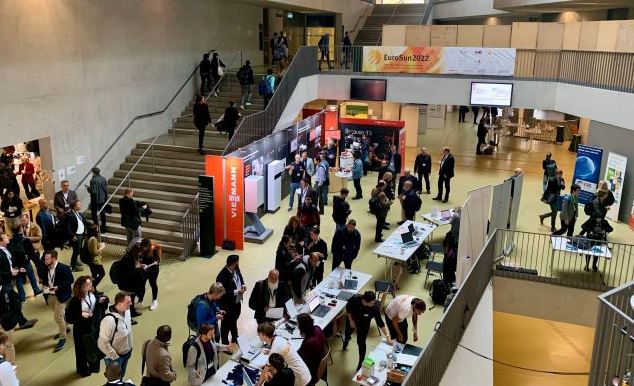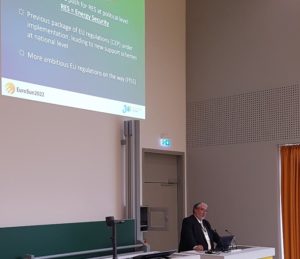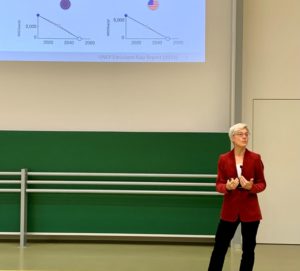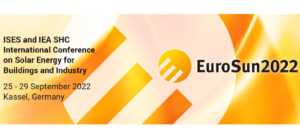EuroSun 2022: Renewables enable crisis-proof heat supply and energy security
October 4, 2022
480 solar experts from more than 50 countries gathered in Kassel from 25 to 29 September 2022 for EuroSun 2022 – the International Conference on Solar Energy for Buildings and Industry. The joint event of the International Solar Energy Society (ISES) and the IEA Solar Heating and Cooling Programme (IEA SHC) came to a clear conclusion: a sustainable and crisis-proof heat supply and energy security is possible with renewable energies. The components are heat pumps, solar energy and district heating, based on local heat planning.
Photo: Stephanie Banse
Since the first EuroSun Conference in 1996 it has become one of the main events on solar energy for buildings and industry in Europe. From this year onward, EuroSun will be a joint conference organised by the ISES and the IEA SHC. “This new collaboration is exciting because it strengthens the cooperation between our two organisations and underscores how vital solar energy technologies are for achieving climate-change goals”, stated IEA SHC Chair Tomas Olejniczak in his welcoming speech.
The conference’s focus on heat supply, especially for buildings and industry, could not be more timely because the consequences of climate change are now being felt more than ever throughout Europe and the world. Solar researchers and the solar industry are being asked to demonstrate the enormous potential of solar in combating climate change and the transformation to a world powered by renewable and sustainable energy.
EuroSun 2022 pooled the expertise and knowledge of leading international scientists during the five days of the conference. 16 speakers from leading European and international institutions, 153 expert lectures, 145 poster presentations, 6 workshops as well as 2 excursions to solar industry and research institutions offered a varied programme.
Exchange between young and established experts
The conference presented the latest research results, trends and technological developments from the fields of components and applications as well as topics of general importance such as solar radiation and economic efficiency. The special focal points were thermal storage systems as well as digitalisation and artificial intelligence. Numerous event formats aimed at young researchers underlined the conference’s claim of being future-oriented and promoting the exchange of knowledge between young and established experts.
Prof. Klaus Vajen, ISES President and Co-Chair of the conference, also emphasised the relevance of the location of the event: “Kassel is the centre of the German renewable energy sector with a high number of renewable energy companies, research institutes, and educational facilities located in and around the city. As a driving force for the local economy, renewable energy research and development account for over 12,000 jobs regionally.”
RES = Energy security

Pedro Dias, Secretary General of Solar Heat Europe Photo: Bärbel Epp
Pedro Dias, Secretary General of Solar Heat Europe, also described renewables in his keynote talk on New Legislative Requirements and Overview of the Market as the key to future energy security. “Currently, there is an unprecedented push for renewables at the political level,” Dias stated. “The previous package of EU regulations is being implemented, leading to new support programmes at national level. In addition, more ambitious EU regulations are on the way.”
“Targets are set but the implementation gap is huge”

Brigitte Knopf, Mercator Research Institute on Global Commons and Climate Change (MCC) Photo: Stephanie Banse
“There are still abundant fossil fuels in the ground, but the disposal capacity of the atmosphere is limited”, said Dr Brigitte Knopf, Secretary General of the Mercator Research Institute on Global Commons and Climate Change, summing up the problem of global climate policy in her keynote speech during the opening. Emissions from fossil energies will continue to rise. Corona has done little to change this. “We are still stuck in the age of fossil fuels,” Knopf stated. “The goals are there, but the programmes to achieve them are often still missing. It’s a bit like New Year’s resolutions. You want to do more sport in the new year, but it’s not clear how you’re going to do it. At the end of January, the good resolutions are then postponed until next year.”
To solve this problem, Knopf sees the key in the pricing of CO2 emissions, flanked by clever policy packages including price instruments, technology standards, subsidies, bans, and information. With the right measures, both the energy and climate crises could be overcome. Renewables should be ramped up as fast as possible. Energy efficiency has to be taken much more seriously and lock-ins into (new) fossil fuel infrastructures should be avoided. In addition, cushioning the energy crisis is a key factor.
“Targets are set but the implementation gap is huge. We need measures, measures, measures,” summarised Knopf. “The Climate Conference COP27 in Egypt needs to send a strong signal for keeping climate protection high on the agenda.”
Organisations mentioned in this news article:
EuroSun 2022: https://www.eurosun2022.org/
ISES: https://www.ises.org/
IEA SHC: https://www.iea-shc.org/
Solar Heat Europe: http://solarheateurope.eu/
MCC: https://www.mcc-berlin.net/en/index.html


